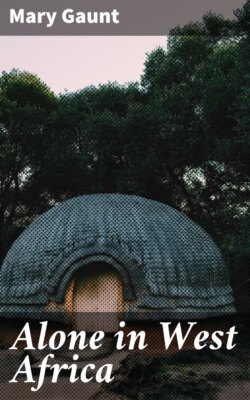Читать книгу Alone in West Africa - Mary Gaunt - Страница 13
На сайте Литреса книга снята с продажи.
Оглавление
The groundnut grows on a vine, and behind the factory this was all garnered into great heaps, and surrounded by crinted fences until time should be found to comb out the nuts. In the empty fields shy women, who dared not lift their faces to look at the strange, white woman, were gleaning, and the little, naked children were frankly afraid, and ran shrieking from the horrid sight. And just behind the factory were little enclosures of neatly plaited straw, and each of these contained a man's crop ready waiting to be valued and bought by the trader. Kossun was the only place where I saw the nuts as they belonged to the grower. All along the river there were heaps of them, looking like young mountains, but all these heaps were trader's property. At Nianimaroo, on the lower river, I saw a heap, which the pleased proprietor told me was worth £1000. He apparently had finished his heap, and was waiting to send it down the river, but everywhere else men, picturesque in fluttering rags or grotesque in cast-off European garments, were bringing calabashes and sacks of groundnuts to add to the heaps; and, since they cannot walk on the yielding nuts, which are like so many pebbles under their bare feet, little board ladders or steps of filled sacks were placed for them to run up. And no sooner were the heaps piled up than they had to be dug out again.
At Fatta Tenda, on the way down, having got rid of her cargo and her deck passengers, the Mungo Park began to load again with groundnuts; and men were busy through all the burning hot midday digging into the groundnut heap, filling up sacks, and as the sacks were filled stalwart, half-naked black men, like a line of ants, tramped laden down the steep bank and poured their loads into the steamer's hold in a cloud of gritty dust that penetrated everywhere. The trader told me that when he wanted labourers he appealed to one of the principal men who live in the town a mile or so behind the wharf, and he sent in his “family,” who are paid at the rate of a shilling a day. It is very, very doubtful whether much of that shilling ever reaches the man who actually does the hard work. Things move slowly in the Gambia as in all Africa, and “family” is probably a euphonious term for household slave. After all, it is possibly only like the system of serfdom that existed in Europe in days gone by and will not exist very long here, for knowledge is coming, though it comes slowly, and with wealth pouring into the country and a Commissioner to appeal to in cases of oppression the black man will presently free himself. Even the women are already beginning to understand the difference. The morals of the country, be it remembered, are the primitive morals of a primitive people. A man may have four legal wives by Mohammedan law. He may have ever so many concubines, who add to his dignity; and then, if he is a big man—this was vouched for by the official native interpreter, who joined his Commissioner at M'Carthy—he has ever so many more women in his household, and these he expects to have children.
It is their business and he sees that they do it, and the children belong to him no matter who is the father. Children, it will be seen, are an asset, and the woman is now beginning to understand that the children are hers alone, and again and again a troubled woman, angry and tearful, walks miles to appeal to the travelling Commissioner, such and such a man, her master has taken away her children and she has heard that the great white master will restore them to her. And in most cases the great white master, who has probably a laughing, round, boyish face, fancies he has not a desire above good shooting, and speaks of the country as “poisonous,” does all that is expected of him and often a good deal more also.
